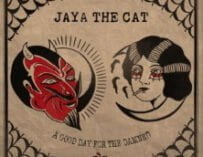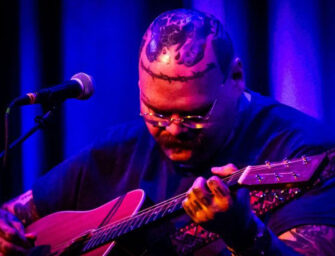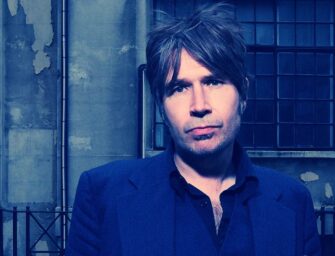
Dropkick Murphys’ Al Barr: “We really had to pull ourselves out of the womb of creativity”
We caught up with the vocalist of Celtic punks Dropkick Murphys as they prepare to release arguably their strongest record
Celtic punks Dropkick Murphys have never been a band to shy away from expressing their opinions, or tackling the harsh reality of life. Their latest album 11 Short Stories Of Pain & Glory is no different. Due to be out on 6 January 2017, it is the band’s ninth studio album and arrives almost two decades since their debut album Do Or Die was released in 1998 with original vocalist Mike McColgan. With McColgan departing the band that same year, current singer Al Barr took the reins and the band have never looked back.
The band are renowned for ramping up traditional Irish folk songs and hosting week-long St. Patrick’s Day shows in and around the Boston area. Their song I’m Shipping Up To Boston was featured on the 2006 film The Departed, becoming the band’s only platinum-selling single to date.
As the band prepares for a European and US tour in January to support the album’s release, we spoke to the singer about the ups and downs of working away from home and issues closest to the band’s heart.
What inspired the band’s name?
“The name Dropkick Murphys comes from the name of a ‘dry-out house’ set up by John Murphy in the 40s. He was a tough guy, a football player and wrestler, when alcohol used to contain stuff like horse tranquiliser and he saw lots of addiction. So, he would get these people and tie them down and dry them out. He eventually opened a farm for people to get off booze, and much later on famous people like Jackie Gleason went through there. Even today, I’ve had friends on beaches in other parts of the country and they’ve been wearing our T-shirts and old guys who don’t know about the band, but know about the dry-out house come up and say, ‘My dad used to threaten to send me there if I didn’t stop drinking’.”
Has the songwriting process changed much over the years?
“With this record it was the first time we had left Boston. It was something we had never done before and we were working 10-12 hours a day and we really had to pull ourselves out of the womb of creativity. In Texas, we found we weren’t conflicted. We stopped to sleep and eat; always immersed in the project.”

Dropkick Murphys: “You had six guys from New England in the desert”
Due to the terror attacks in Boston, the material on the album is darker like in the song 4-15-13. Were there any doubts about approaching the events and putting them into a song?
“We carefully approached the events, they’re terrible tragedies. When you’re singing about tragedy that happened 200-100 years ago, you put a different perspective on it because people who hear the songs weren’t around. At the time of the Boston bombings we were on tour, and we talked about cancelling, which we didn’t in the end. Instead we put out T-shirts with ‘For Boston’ written on them for fans to order, and all the profits went to victims. In a week or two we had raised $400,000 for the victims, which is humbling as a band to see that outpouring of love for Boston.”
You’ve met some of the victims of the Boston bombing and seen the impact it has had on them. Are you nervous or worried about their reactions to the songs?
“We haven’t worked the new songs into a live set yet. So, haven’t had the chance to see the reaction from the wider audience. But the people who have heard them there’s lots of emotion connected.”
This is the first album the band have recorded outside of Boston. Given the themes of the songs, could they have been recorded in Boston, or did you leave for reasons of catharsis?
“There was a resistance to leave [Boston] to record, but after two days something happened, something magical. You had six guys from New England in the desert – [the record] wouldn’t have sounded the same recorded in Boston. We were always together, that’s something that isn’t normal when we record in Boston. We all come in and leave at different times. So, it was pretty amazing and it lends to creativity.”
The title of the album is quite provocative. Would the album have happened if it wasn’t for the terror events of the last few years?
“A lot of the songs are about the drug crisis in the US and New England and it’s something that all our families have been touched by and it’s out of control. The songs are trying to bring awareness – the industry is providing drugs that kill kids.”
How long did the album take to write?
“Some of the songs we started to put together a year, maybe a year and a half ago. But a lot of the songs didn’t make the demo. When we got down to Texas we found a mineshaft full of gold. There was inspiration, creativity and musicianship there. I think this is our best record. I know every artist says that about their latest album, but you can take any song from this record and put it up against any song we’ve done previously and it’ll be just as good, if not better.”

Dropkick Murphys: “We won’t break up because we feel we still have something to say”
Did you go into the studio fully prepared and rehearsed?
“About 85 percent was written before we left Boston and the rest were written at Sonic Ranch in Texas. The recording rooms and equipment they had played into the final sound.
Was the recording process faster because you wanted to get home, or did you drag it out to stay longer as kind of a holiday?
“[Laughs] It was beautiful down there, but it certainly was not a holiday. No, I wouldn’t say it was a holiday, we certainly didn’t draw it out. It went faster because we were always together, so it was smoother than in the past.”
Your tour begins in January. Is touring still something you enjoy or are you indifferent about it after all these years?
“No, not indifferent, it’s hard. I’m the older statesman in the band and four out of the six have kids, so when your kids are saying, ‘Daddy we don’t want you to go,’ it tugs at the heart strings. I always say if you could beam me onto stage from home that would be great, but that’s obviously not realistic. And as the older statesman I have exercises that I do like breathing and vocal warm ups – everything that isn’t rock ‘n’ roll. I’ve been in bands 34 years and the energy you think will always be there is not there these days. But the music keeps you young.”
Bands at the stage of their careers where you’re at don’t tend to plan ahead too much. Who decides and gathers the group when it’s time to put out another album?
“It’s four years since the last record and there are times where you have to shit or get off the pot. We won’t break up because we feel we still have something to say. I write on my own, and Tim Brennan who plays keyboards writes all the time, too. If I come up with a melody or lyrics I write them down – it’s about always writing.”
Interview: Dave Chrzanowski
Dropkick Murphys’ new album 11 Short Stories Of Pain & Glory is out on 6 January. For more info, check out: dropkickmurphys.com



































Thanks Dave, great interview. Can’t wait to hear the new songs at Brixton next month with Slapshot.
Amazing article. Al and entire DKM family – if the first three songs are any indication, this may be the best CD since Do or Die. So much heart in the music. Thank you for always putting so much heart a d raw emotion into every album you do??